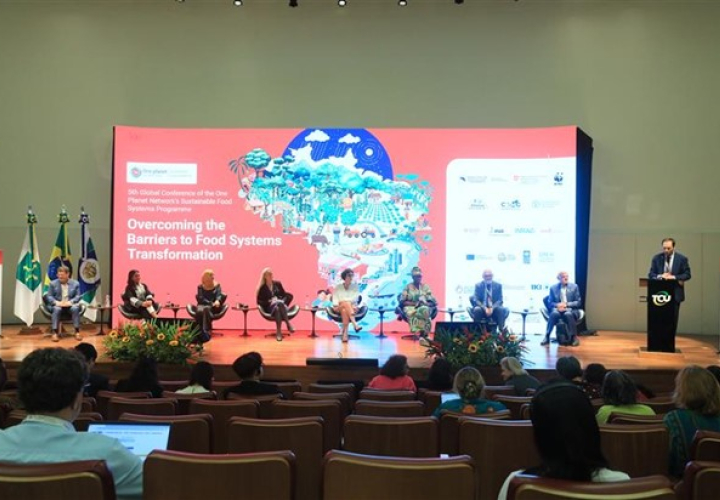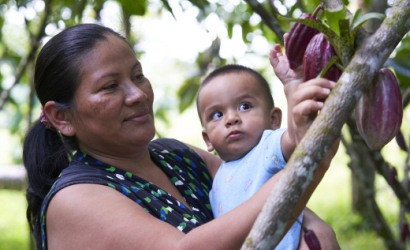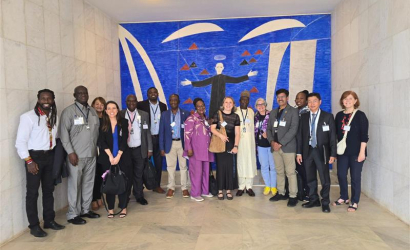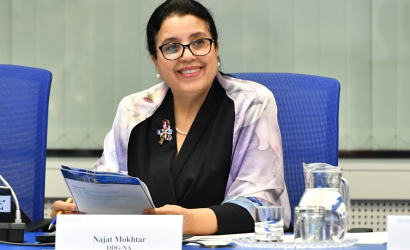Following the conclusion of the One Planet Network 5th Global Conference of the Sustainable Food Systems Programme (SFSP) in Brasília, Brazil there is growing momentum to take bold decisions in the key policy fora in 2025, such as the UNFSS+4 Stocktaking Moment and UNFCCC COP30. The Healthy Diets from Sustainable Food Systems (HDSFS) Coalition members had significant involvement through in-person and remote participation in events through a Country Member representative from Yemen and Academic partner University of Ghana. The conference brought together key stakeholders from across government, civil society, and multilateral institutions to discuss how to overcome barriers impeding food systems transformation.

During Day 1 (recording found here), Dr. Amos Laar, HDSFS Coalition Academic partner from the University of Ghana, spoke on the panel Solutions Workshop 1: “Leveraging social protection & school meals through sustainable food.” He started his intervention with a well-known African proverb; “our planet is not just what we have inherited from our ancestors, but what we have borrowed from future generations” to underscore the deep responsibility that we bear for sustainable production and consumption. To address these challenges, he highlighted that sustainable public food procurement is a way to integrate nutrition, livelihood, biodiversity, and climate resilience. He outlined the results of a report commissioned by WHO and Initiative of Climate Action and Nutrition (I-CAN) and the HDSFS Coalition to analyze the climate, nutrition and related policies in Ghana, and explained how siloed governance creates barriers to realize sustainable public food procurement goals.
He further explained the barrier of having policies that are not impactful due to implementation challenges. He concluded that while it is good to aim high for food system transformation goals, it is important to catalyze action on “low hanging fruits.” This requires identifying concrete entry points and co-benefits. For Ghana to have nutrition policies that impact the environment and climate policies to impact nutrition, it is possible to leverage co-benefits utilizing multisectoral collaborative frameworks that do not produce new structures. In Ghana this includes the multi sectoral planning group for nutrition as well as the National Nutrition Partners Coordination which seek to leverage linkages between climate and nutrition.

On Day 2 of the conference (recording link found here), Ms. Karima Al’Hadaa, Planning & Liaison Specialist Ministry of Planning & International Cooperation, Yemen and HDSFS Coalition member country focal point spoke in Plenary Session 3: “Convergence & Coherence: aligning policies and actions on climate, biodiversity.” She discussed how nutrition, food systems, and climate must be integrated in national and sectoral development plans, as found in the example of Yemen’s multisectoral nutrition action plan (MSNAP) launched for the years 2020-2023. This plan was built to address the challenges that exist in Yemen due to the siloed nature of development and humanitarian aid. With support of coalitions and international experts, Yemen was able to link policies at the national level and learn from the global level to develop the basis of MSNAP.
Ms. Al’Hadaa outlined how Yemen has overcome several barriers in the development of the MSNAP, including developing a plan that is multistakeholder and multisectoral. Through developing a governance structure from the national to local level, they led operations via a steering committee, multistakeholder technical team, Nutrition Information System (NIS) working group, communication and advocacy working group, and finance working group. She shared that by developing a joint action plan, they considered the comparative advantage of each stakeholder and utilized a platform for convergence and alignment of actions in a common result framework. To overcome barriers on the national level interventions, Ms. Al’Hadaa outlined the need for the accelerated approach based on the MSNAP guidelines, which allowed for policy convergence and use of mechanisms like the Geographical Indicators Tool.
Equity and inclusiveness are also integral to the MSNAP. “Girls and women are at the heart of the MSNAP,” she stated. She shared how through the prioritization of women in girls in nutrition, the government is focusing on women and girls in the health services, education, and agriculture sector. Finally, she concluded “I think the Healthy Diet Coalition is an important platform that can break the silos for nutrition.”
Additionally, H.E. Brieuc Pont, France’s Special Envoy on Nutrition and Secretary General of the Nutrition for Growth Summit, attended by invitation from UN-Nutrition and gave remarks. He highlighted the importance of continuity of nutrition financing and political commitments moving forward. He gave advice on how countries can move forward from the N4G Summit into the UNFSS+4 by reflecting on the importance of integrating nutrition in every development policy. He concluded that “this Summit on nutrition wasn’t about nutrition. Nutrition is only a method, a new way of crafting development” which outlines a vision for the post 2030 development strategy that brings together multiple areas of expertise to design tailor-made solutions to countries.
Overall, the participation of HDSFS in the OPN conference allowed partners to share the progress and priorities of nutrition policy convergence in their countries. The conference served partners to gain a better understanding, guidance, tools and resources to deepen their collective efforts towards more healthy, equitable and sustainable food systems pathways.



